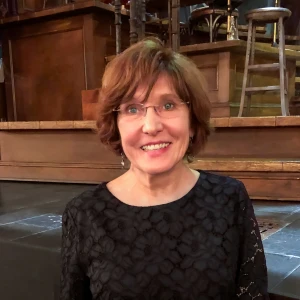
Jacquelyn Dowd Hall grew up in Pauls Valley, Oklahoma. In college in Memphis and then graduate school in New York, she came of age with the civil rights and women’s movements of the 1960s and 1970s. She has been—at some level—thinking about the women or at least the kinds of women who populate Sisters and Rebels for most of her writing and teaching career.
She stumbled on Katharine Du Pre Lumpkin’s autobiography while writing her first book. As founding director of the University of North Carolina’s Southern Oral History Program, she learned that Katharine was only one of three fascinating sisters, each of whom grappled with a family legacy of slaveholding in which devotion to white supremacy and veneration of the Confederacy went hand in hand. The eldest, a true believer, had died ten years before. But Katharine and Grace, who, in her day, had been a celebrated radical novelist, were very much alive. Hall sought them out for interviews which, decades later, became the seeds of her new book.
Hall is Julia Cherry Spruill Professor Emeritus at UNC-Chapel Hill. She was one of the founders of the modern field of women’s history and helped to spark a thriving scholarship in southern labor history and to turn the study of the civil rights movement in new directions. She was awarded a National Humanities Medal for her efforts to deepen the nation’s engagement with the humanities by “recording history through the lives of ordinary people, and, in so doing, for making history.” She is past president of the Organization of American Historians and the Southern Historical Association and founding president of the Labor and Working Class History Association. Her books and articles include Revolt Against Chivalry: Jessie Daniel Ames and the Women’s Campaign Against Lynching (1979, 1993); Like a Family: The Making of a Southern Cotton Mill World (1987, 2000); and “The Long Civil Rights Movement and the Political Uses of the Past,” Journal of American History (2005), an effort to challenge the myth that the movement was a short, successful bid to overcome segregation in the Jim Crow South. She has won awards for graduate teaching and contributions to the fields of oral history and working-class history. She has held fellowships from the Guggenheim Foundation, the Center for Advanced Study in the Behavioral Sciences, the Radcliffe Center for Advanced Study, the National Humanities Center, and other institutions. She was elected to the Society of American Historians in 1990 and the American Academy of Arts and Sciences, one of the nation’s most prestigious honorary societies, in 2011. Her most recent book, Sisters and Rebels: A Struggle for the Soul of America (2019), won the 2020 PEN America/Jacqueline Bograd Weld Award for Biography, the 2020 Summersell Prize for the best book on the history of the American South, a 2020 PROSE Award from the Association of American Publishers for outstanding work by a trade press, and the Bell Award from the Georgia Historical Society for the best book in Georgia history. It was a co-winner of the Sydnor Award from the Southern Historical Association for the best book in southern history and of the Julia Cherry Spruill Prize for the best book in southern women’s history and the Willie Lee Rose Prize for the best book on any topic in southern history written by a woman, both from the Southern Association of Women Historians. It was also a finalist for the Plutarch Award from Biographers International. In 2020, she and Bruce Baker edited, introduced, and published Katharine Du Pre Lumpkin, Eli Hill: A Novel of Reconstruction (Athens: University of Georgia Press).
Other books by Jacquelyn Dowd Hall:
Like a Family: The Making of a Southern Cotton Mill World (co-authored with James Leloudis, Robert R. Korstad, Mary Murphy, Lu Ann Jones, and Christopher R. Daly). Albert J. Beveridge Award, American Historical Association; Merle Curti Social History Award, Organization of American Historians; Philip Taft Labor History Prize, Cornell University, School of Industrial and Labor Relations.
Revolt Against Chivalry: Jessie Daniel Ames and the Women’s Campaign against Lynching. Francis B. Simkins Award, Southern Historical Association; Lillian Smith Award, Southern Regional Council. As a dissertation: the Bancroft Dissertation Award, Columbia University, 1974 (best dissertation in history, diplomacy, or diplomatic affairs).
Selected additional publications:
- “The Long Civil Rights Movement and the Political Uses of the Past,” Journal of American History 91 (March 2005). Reprinted in Best Articles in American History, 2007, ed. Jacqueline Jones (New York, 2007).
- “Disorderly Women: Gender and Labor Militancy in the Appalachian South,” Journal of American History 73 (September 1986). Berkshire Conference of Women Historians Annual Article Prize (best article on any historical subject written by an American woman); Binkley-Stephenson Award, Organization of American Historians (best scholarly article published in the Journal of American History). Reprinted in multiple anthologies.